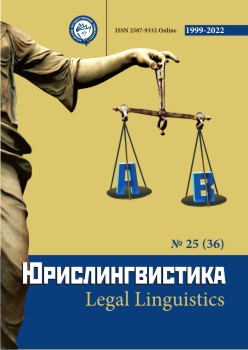On the Language of the Special Part of the Modern Criminal Law
Abstract
The article concentrates on the study of the language of the Special Part of the Criminal Code of the Russian Federation as a component of legislative technique. It outlines some debatable issues of using the language when constructing dispositions of the articles of the Special Part of the Criminal Code of the Russian Federation. The author draws attention to some terminological ambiguity in modern criminal law. The legislator uses terms, the content of which is not always uniformly rendered in practice, which entails various penal consequences for the perpetrators of crimes. For example, the same actions of a person can be considered in some cases as a completed crime, in others as an attempted crime. The practice of applying Art. 126 of the Criminal Code of the Russian Federation and Art. 138.1 of the Criminal Code of the Russian Federation, the ways of possible elimination of emerging contradictions in the practice of applying the law are indicated. Attention is drawn to the presence of different terms used to refer to the same concepts, as well as the opposite situation - when one term means different things. Corpus delicti with administrative prejudice is given as an example. It is important to strive for the unification of terms that mean the same thing, to exclude situations where the same term in law has a different meaning. The article envestigates the issue of excessive definition of terms in the Special Part of the Criminal Code of the Russian Federation the content of which is clear to the law enforcer. Also, redundance in the definition of terms the content of which is specified in the sectoral legislation is indicated. Such definitions increase the scope of legislation, but have no practical meaning. The author comes to the conclusion that the language of the Special Part of the Criminal Law should be understandable. The terms used by the legislator must be clear and have a well-established common understanding. The brevity and length of the articles of the Special Part of the Criminal Law should not damage their accuracy and clarity.
Downloads
Metrics
References
Голенко Д.В. О тенденциях развития Особенной части Уголовного кодекса Российской Федерации / Юридический вестник Самарского университета. - 2021. - Т. 7, № 4. - С. 26–29. DOI: https://doi.org/10.18287/2542- 047X-2021-7-4-26-29
Голенко Д.В. Проблемы применения простой диспозиции статьи особенной части уголовного закона (на примере ч. 1 ст. 126 УК РФ) / Юридический аналитический журнал. 1- 2021. - № 6 (1). – С. 49–58. DOI: http://doi.org/10.18287/1810-4088-2021-16-1-49-58.
Иванчин А.В. Конструирование преступления: теория и практика. М., 2020.
Керимов Д.А. Законодательная техника. М., 2021.
Комментарий к Уголовному кодексу Российской Федерации (научно-практический) / под ред. А.И. Чучаева. М., 2019.
Мякишева Ю. Закрыли дело против курганского фермера, купившего GPS-трекер / Российская газета. URL: https://rg.ru/2018/03/21/reg-urfo/delo-protiv-fermera-kupivshego-gps-treker.html
Приговор Одинцовского районного суда г. Москвы по делу № 01-0025/2020. URL: https://mos-gorsud.ru
Присматривать разрешается / Российская газета. Столичный выпуск - № 172 (7930). URL: https://rg.ru/2019/08/06/zakon-stal-menee-strog-k-vladelcam-tak-nazyvaemyh-shpionskih-gadzhetov.html
Copyright (c) 2022 Диана Голенко

This work is licensed under a Creative Commons Attribution 4.0 International License.
The authors, which are published in this journal, agree to the following conditions:
1. Authors retain the copyright to the work and transfer to the journal the right of the first publication along with the work, at the same time licensing it under the terms of the Creative Commons Attribution License, which allows others to distribute this work with the obligatory indication of the authorship of this work and a link to the original publication in this journal .
2. The authors retain the right to enter into separate, additional contractual agreements for the non-exclusive distribution of the version of the work published by this journal (for example, to place it in the university depository or to publish it in a book), with reference to the original publication in this journal.
3. Authors are allowed to post their work on the Internet (for example, in a university repository or on their personal website) before and during the review process of this journal, as this may lead to a productive discussion, as well as more links to this published work (See The Effect of Open Access).











